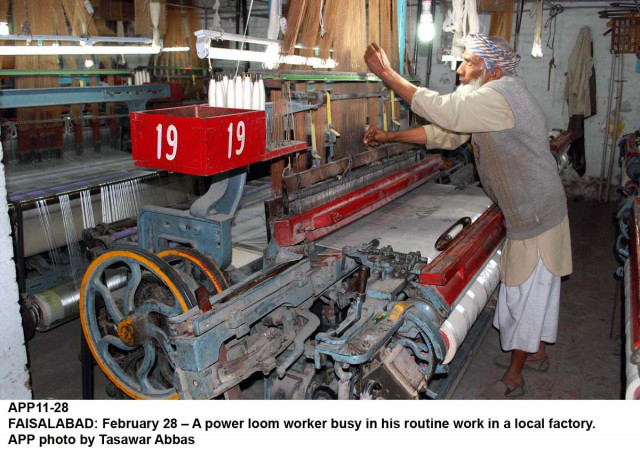Going down: Millers jump ship as textile industry sinks
Energy crisis forces industrialists to abandon production.

Khalid Saeed is no longer the industrialist who owned Wahab Textile Mills in Faisalabad; he sold off his manufacturing plant’s machinery to a scrap dealer and has opted instead for the real estate business.
Saeed’s story does not surprise most businessmen in Faisalabad. The fallout from the energy crisis has laid waste to Faisalabad’s once thriving industrial complexes; its effect most profound on the textile industry. In the midst of growing uncertainty and frustration, fresh investment has all but dried up, and new projects have ground to a halt. Meanwhile, increasing numbers of millers have started switching over to other sources of income after writing off heavy losses. Some, like Saeed, have sold their plants to scrap dealers and converted industrial land into residential colonies.
When asked why he opted for such a drastic switch, a disillusioned Saeed says he believes that the textile industry has entered its twilight; production and exports are falling, the law and order situation has worsened and political instability, gas closures and prolonged electricity load shedding have dealt a blow to the industry from which it may never recover.
In such conditions, he says, businessmen have little hope but to look towards the services sector. Having abandoned textile manufacturing, Saeed is now focusing on a string of projects: he is working on the Marhaba residential colony, Marhaba departmental stores, Marhaba Fried Chicken and Excel Labs, all in Faisalabad.
Awais Dogar, once CEO of Awais Textile Mills, told The Express Tribune that he too has sold his units and invested in Eden Gardens, an umbrella project of residential colonies. He expressed frustration at the suspension of gas supply for indefinite periods, the rising cost of production, sky-rocketing inflation, high mark up rates and the economic slowdown as the cause of closure of his industrial units.
Ghulam Farid, ex-owner of Farid Textiles Faisalabad, purchases vast tracts of agricultural land for cultivation and resale. He says that the extraordinary energy shortages were the prime reason for the decline of the textile sector and ultimately forced millers to change their business lines.
Other industrialists have chosen to shift capital outside Pakistan. Bangladesh has been a destination of choice for people like Rana Irtaza, manager of Tauseef Enterprises, who has established two mega textile units there. Worsening domestic conditions force millers to think about different businesses and investing out of Pakistan, he says. Faryad Niamat, once CEO of Niamat Textile Faisalabad, agrees. Like Irtaza, Niamat too opted to invest abroad rather than risk continuing production in uncertain times.
Over the last couple of years, trade bodies’ representatives and millers have been urging the government to speed up its efforts to overcome the gas and electricity crisis, but the government has yet to take any concrete steps or give tangible assurances. Billions of dollars worth of machinery gathers dust due to prolonged hours of load shedding, forcing millers to sell it off as scrap rather than tie up their capital in an unproductive pursuit. The lack of faith in positive government intervention has presented dejected industrialists with few alternatives than to take the bitter pill and do the previously unthinkable.
To most, the death knell has already been sounded for industrial pursuits in Pakistan.
Published in The Express Tribune, March 6th, 2012.



















COMMENTS
Comments are moderated and generally will be posted if they are on-topic and not abusive.
For more information, please see our Comments FAQ